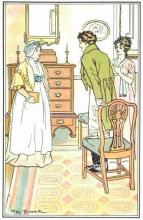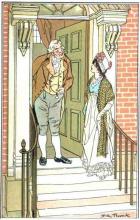inspiration + perspiration = invention :: T. Edison ::
We've finally made it: there are only three more chapters of Estancia Aldea Norteña to release. Astute readers may have noticed that's three more than Austen's Northanger Abbey contains. I didn't plan to write more than the original; my broad outline heaved very closely to NA's structure, so I figured it would be 31 just like my sequel novel Gentlemen of Gloucestershire. However, I eventually realized I needed to rethink my assumptions on how to properly end the story.
I've thought a lot about adaptations lately, between a recent Tor.com article, a local production of Pride and Prejudice, and other Jane Austen fan fiction I'm reading. Rather than write another manifesto like I did in the Tor comment thread, I'm going to focus today on what Austen's endings tell us about her novel's plots, and how I've struggled to stick the landing in my own writing.
 The hero's arrived, must be time for the book to end (Ch 30, 1915 Brock).
The hero's arrived, must be time for the book to end (Ch 30, 1915 Brock).
Any modern adaptation of Jane Austen, whether keeping to the Regency period or updating the time frame, has to grapple with that author's falling action. Or rather, the lack of it, from a romance perspective. Often the proposal is only one step removed from the ending, and we do not get the exact words, usually just a quick summary. Ditto for the wedding. There's just a quick "where are they now" epilogue if readers are lucky.
Northanger Abbey ends quite abruptly. Henry shows up, proposes, and exits stage right within a few pages; even less ink is spent on Eleanor's nameless beau inheriting a fortune, marrying her, or their persuading General Tilney to grant his consent to the main match. The final chapter breezes over months of waiting with little to no detail, although I filled in some of that gap with my book Trifles Light as Air (available at select retailers now, if you'll forgive the self-indulgent plug).
Filmmakers and fandom authors alike have edited these closing moments to address the inevitable hanging questions. After all, isn't wedding what we've all been waiting for? The will-they-or-won't they finale? At least it offers the moment for a period appropriate kiss!
While courtship and matrimony are key components of any Austen novel, I don't believe they are primarily romances any more than Shakespeare's Henry V is just about the war with France. Instead, battles are the narrative structure whereby Prince Hal transforms from a hapless boyhood into the legendary king of Agincourt fame. Similarly, Austen's ladies each make some key discovery about themselves in the midst of pursuing and being pursued, overcoming obstacles to improve their characters. In that light, the wedding is as perfunctory as that of King Henry's at the end of the play; or rather, it's the icing on a cake already rich and fulfilling.
In that light, the final proposal should not be a climatic moment. Indeed, in most of Austen's novels, it's rather anticlimactic (and in Mansfield Park, we don't even get that scene, just assurance that it eventually happened!) Rather, marriage personifies the fulfillment of the character's journey, with earlier scenes usually showing how the heroine has learned some important truth and put it in practice. The wedding is truly a sacrament testifying to an internal transformation.
Time to get real with my readers. My hard drive is full of story ideas from years ago that I've failed to make work. I can usually write cheerfully for a while, researching and outlining and even designing artwork. But like my chess game, I tend to falter past the opening moves. In fact, I'm currently struggling with a play script that I have yet to develop a proper narrative out of all the concepts I've tossed in.
To continue the chess metaphor, I was so excited when I actually approached the endgame while writing Gentleman. At last, I could see the ending, I knew where I was going, I had an idea of how to make it work!
 General Tilney courting Catherine instead of hating her (Ch 13, 1915 Brock)
General Tilney courting Catherine instead of hating her (Ch 13, 1915 Brock)
Elation turned to despair at Chapter 25, as I had absolutely no idea how to harmonize Catherine and her father-in-law. Everything I considered felt like a cheat instead of resolving their conflict in a believable way. I'd done too good a job presenting General Tilney's stubbornness and short of an authorial deus ex machina, I could not see any way for the lady to change his mind.
Then I realized General Tilney wasn't the character to focus on. The point wasn't for him to see things her way or vice versa. Catherine as protagonist needed to be the central figure in the climax, bring together all the little bits of her adventure to demonstrate the growth she'd undergone along the way.
Enlightenment came in recognizing his expectations were inconsistent, unrealistic, and ultimately without any real power over her life. Burgeoning wisdom took the form of Catherine approaching the general as a fellow adult, with both respect and forbearance, rather than a supplicant begging for acceptance.
Finishing Gentlemen gave me the confidence I needed to believe I could do it again with Estancia. Nevertheless, I ended up cutting nearly an entire chapter that would have come next in the story.
This decision was very difficult. I have a bad habit of revising things to death without ever advancing. I tried to ignore my misgivings and simply write boldly onward. But my dissatisfaction grew with every sentence. Chapter 31 was already exposition heavy; I even called it "The Past is Revealed." Yet here I was in the very next chapter with Enrique revealing further details and plot points.
It was all great, juicy stuff to explore. And it was completely sapping the novel's forward momentum. There was so much to explain, all of it maudlin navel-gazing from the character least inclined to do so, and it was flipping the narrative on its head. Suddenly the novel wasn't about a girl learning about herself and working towards a better future. It was about a guy who wouldn't shut up about his problems, which is neither romantic nor empowering for either party.
So I scrapped days of writing to start over. I'd known from the getgo that a marriage proposal wasn't in the cards at this moment, and substituted college admission as a capper to Catalina's educational arc. Again, I realized the focus should be on her feelings and reactions; all that backstory could still exist but really wasn't necessary to reveal. It was more important to establishing Catalina's new normal (light spoilers ahead): attending the local technical school while Enrique returned to Mar del Plata and carved out a more independent life. Simple, to the point, and easily setting up their eventual reunion.
Stories require commitment of time and attention to appreciate, and thus demand an eventual payoff either comedic or tragic. The Pride and Prejudice show I recently attended was very funny and yet struggled to reconcile its modern sensibilities with the novel's conclusion. The script shied away from settling its central crisis—whether marriage is a game, an obligation, or an opportunity—and so the last few scenes didn't quite satisfy despite the laughs.
From my own writing experience, a successful adaptation explores a fundamental question about its source material in a meaningful way. Gentleman pondered how the Tilneys could be reconciled to each other. Estancia, like NA, studied what might turn an ordinary girl into a heroine. I would love to revisit both worlds in the future, although I'm still unsure what story to tell.
I'll be sure to let you know when I find the answer.
Finally (really really for reals): next Monday we'll experiment with another interactive blog post summarizing Estancia Aldea Norteña with memes. Take a look at the one for Gentlemen of Gloucestershire and return in a week with your best online storytelling props to share (though let's keep it general audience rating). Bonus points for any telenovela references. I look forward to seeing what anyone comes up with as we close in on the finale.





